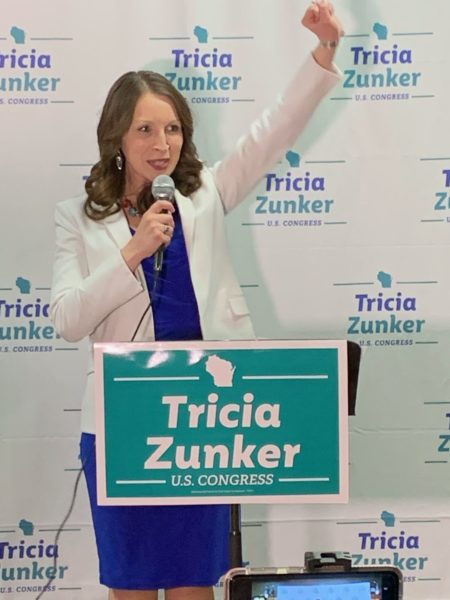
- Details
- By Levi Rickert
WAUSAU, Wis. — Voters in Wisconsin’s 7th congressional district gave Tricia Zunker, a tribal citizen of the Ho-Chunk Nation, a landslide victory on Tuesday in a special primary election to replace retired Congressman Sean Duffy.
Promoting herself as “Voice for the People”, Zunker earned a convincing win against challenger Lawrence Dale. As of Wednesday morning, with 99 percent of the votes reporting, Zunker won 35,564 votes (89 percent) to Dale’s 4,473 (11 percent).
Zunker campaigned on the theme that she would represent the people, not the corporate interests.

“I care about people. I care about other people's grandparents. I care about other people's children. I care about the environment and I care about people having opportunities and I think that this is a message that will resonate across party lines,” Zunker told her supporters in her victory speech.
Zunker will face off against Republican Tom Tiffany, currently a state senator, in the May 12 special election.
If elected on May 12, Zunker will be the third American-Indian woman elected to Congress and the second Ho-Chunk to be elected to Congress.
Zunker is an associate justice of the Ho-Chunk Nation Supreme Court, a law professor, and currently serves as president of the Wausau School Board.
Last week, the Wisconsin AFL-CIO endorsed Zunker. She was previously endorsed by the United SteelWorkers District 2 and the International Brotherhood of Electrical Workers Local 388.
“We can count on Tricia Zunker to be a voice for all working people in Wisconsin. As an Associate Justice of the Ho-Chunk Supreme Court and president of the Wausau School Board, Zunker has the experience needed to bring people together to focus on creating good, union jobs and economic opportunity for this generation and the next,” Stephanie Bloomingdale, president of the Wisconsin AFL-CIO said.
 Tricia Zunker holds up left arm in victory! Courtesy of Zunker campaign.
Tricia Zunker holds up left arm in victory! Courtesy of Zunker campaign.
The May 12 special election is expected to draw national attention because the 7th congressional district is competitive. The district covers 26 counties in Wisconsin—about a third of the state and is one of the largest geographical congressional districts east of the Mississippi. It is also considered a battleground district. The congressional seat was held by a Democrat from 1969 to 2011. Since then, the seat swung to the Republican side.
President Donald Trump won the state by a slim margin of 22,748 votes over Hillary Clinton and the 7th congressional district seat is considered a battleground district, the special election is being watched nationally to see if there has been a shift from Republican to Democrat.
Several tribal nations are located within the congressional district. They include: Bad River Band of Lake Superior Chippewa, Forest County Potawatomi, Ho-Chunk Nation, Lac Courte Oreilles Band of Lake Superior Chippewa, Lac du Flambeau Band of Lake Superior Chippewa, Red Cliff Band of Lake Superior Chippewa, Sokaogon Chippewa (Mole Lake), and St. Croix Chippewa.
Regardless of who wins on May 12, the winner will have to run for reelection in November’s general election.
CLICK to go to Tricia for Wisconsin website
More Stories Like This
Native News Weekly (August 25, 2024): D.C. BriefsNavajo Nation Mourns the Passing of Former Vice President Rex Lee Jim
Deb Haaland Earns Endorsement From Communications Workers of America Local 7076
University Soccer Standout Leads by Example
Two Native Americans Named to Democratic Congressional Campaign Committee's“Red to Blue” Program
Help us defend tribal sovereignty.
At Native News Online, our mission is rooted in telling the stories that strengthen sovereignty and uplift Indigenous voices — not just at year’s end, but every single day.
Because of your generosity last year, we were able to keep our reporters on the ground in tribal communities, at national gatherings and in the halls of Congress — covering the issues that matter most to Indian Country: sovereignty, culture, education, health and economic opportunity.
That support sustained us through a tough year in 2025. Now, as we look to the year ahead, we need your help right now to ensure warrior journalism remains strong — reporting that defends tribal sovereignty, amplifies Native truth, and holds power accountable.
 The stakes couldn't be higher. Your support keeps Native voices heard, Native stories told and Native sovereignty defended.
The stakes couldn't be higher. Your support keeps Native voices heard, Native stories told and Native sovereignty defended.
Stand with Warrior Journalism today.
Levi Rickert (Potawatomi), Editor & Publisher

